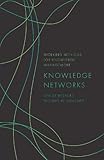Knowledge networks / authored by Denise Bedford (Georgetown University, USA), Thomas W. Sanchez (Urban Affairs and Planning at Virginia Tech, USA).
Series: Working methods for knowledge managementPublisher: Bingley, U.K. : Emerald Publishing Limited, 2021Copyright date: ©2021Description: 1 online resource (xvi, 299 pages)Content type:- text
- computer
- online resource
- 9781839829505
- 658.4038 23
- T58.6 .B43 2021
Includes index.
Section 1. Networks in the knowledge economy -- Chapter 1. Networks in the knowledge economy -- Chapter 2. Network structures and components -- Chapter 3. Knowledge networks section 2. Network structures and behaviors -- Chapter 4. Network nodes and knowledge sources -- Chapter 5. Messaging knowledge -- Chapter 6. Network links, knowledge flows, and relationships section 3. Putting theory into practice - strategies and tactics -- Chapter 7. Developing a knowledge network strategy -- Chapter 8. Designing and operationalizing knowledge network analyses -- Chapter 9. Building capacity for knowledge networks section 4. Everyday knowledge network examples -- Chapter 10. Scientific and research networks -- Chapter 11. Learning networks -- Chapter 12. Industry and business networks -- Chapter 13. Community and group networks -- Chapter 14. Protective and emergency service knowledge networks -- Chapter 15. Civic and political networks -- Chapter 16. Networks of things appendix a. Pulling it all together - sample project plan appendix b. Review of metrics - knowledge, network and business performance.
Networks are essential to mobility - mobility of people, goods, services, communications, and knowledge. The 21st century knowledge economy is dependent upon knowledge mobility and flows. Knowledge networks build upon, but are more complex than, traditional networks. While the network science literature is a starting point, it is not sufficient for modelling or managing knowledge networks. Knowledge networks pay greater attention to nodes as knowledge sources, links as relationships, and the knowledge content of messages. Knowledge Networks describes the role of networks in the knowledge economy, explains network structures and behaviors, walks the reader through the design and setup of knowledge network analyses, and offers a step by step methodology for conducting a knowledge network analysis. Bedford and Sanchez bridge the academic and business perspective of networks. This book illustrates the role of human and non-human actors in these evolving networks, and describes the emerging nature of networks of machines and things. Knowledge Networks is essential reading for business managers, knowledge managers, network analysts, consultants, and researchers in knowledge transfer and translation.
Print version record.
There are no comments on this title.

